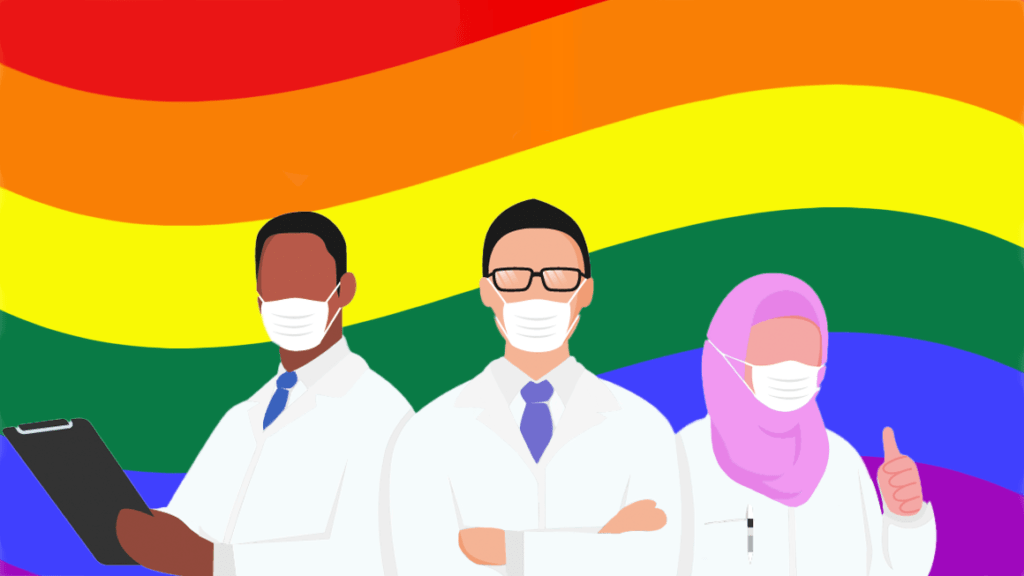
Investigating LGBTQ+ Cultural Competence in Physical Therapy
No two patients are exactly alike. In a clinical sense, two patients recovering from the same condition won’t progress in exactly the same way—and in a social sense, those patients will respond differently to their provider interactions. One patient may respond well to detailed explanations about their care, whereas another may respond to light overviews and unwavering optimism. For these reasons, PTs are well-versed in adjusting their care to meet individual patient’s needs. But even the most flexible PT can stumble on the intricacies of unfamiliar cultural norms and courtesies, inadvertently creating an uncomfortable environment for their patients.
That’s exactly why cultural competence is so important; marginalized communities, like BIPOC patients, deserve to feel fully comfortable during the entirety of their healthcare experience. But that’s not always the case, and when it comes to the LGBTQ+ community, this lack of cultural competence is exactly what Melissa Hofmann, MSPT, PhD, hopes to identify and solve.
There’s a dearth of research regarding the LGBTQ+ community’s relationship with physical therapy.
Hofmann dove into her current research agenda—the relationship between gender and sexual minority health and physical therapy— roughly five years ago when she entered the world of academia. From the get-go, she noticed a startling lack of information about the LGBTQ+ patient population. “When I went into the literature to kind of see what kind of research was available in our field, I was shocked to see that there was essentially nothing,” Hofmann said. “There was maybe, like, three studies in the last 10 years at that time.”
Of the studies that did exist, only one was specific to physical therapy itself—and it focused on academia instead of clinical experiences. “The information was sparse in the rehab sciences. So there definitely was a need to get into this research,” she said.
LGBTQ+ patients typically experience decreased access to healthcare—which makes the lack of research in the PT space a little more concerning.
While the LGBTQ+ community is legally protected from healthcare discrimination, members of the community are still often subject to discriminatory care due to their gender or sexuality. This is especially true for transgender patients (nearly one in three have been refused care because of their gender identity). Because of these experiences, 6.7% of LGBTQ patients avoid doctors’ offices out of fear of discrimination. And of those who’ve experienced discrimination within the past year, 18.4% avoid doctors’ offices.
Hofmann is concerned about those statistics—and that drives her to study the LGBTQ+ community in the rehab therapy arena. “There is a reason why we’re trying to get the baseline information,” she said. “One, because there’s really no information to pull from in our field and, you know, essentially do a needs assessment. You want to know what the climate is for this community in our field of practice.”
To establish this baseline gauge, Hofmann and her peers are conducting a three-prong study (with both qualitative and quantitative assessments) that records LGBTQ+ cultural competency in PT from the perspective of:
- Providers,
- Patients, and
- Academia.
With the qualitative portions of the study, they hope to “really explore what the barriers are, and find the common themes.” And, with the quantitative portions of the study, they hope “to get a more generalizable answer to these issues.”
Initial research results indicate that LGBTQ+ physical therapy patients and providers are experiencing discrimination—even at clinics that pride themselves as inclusive.
While Hofmann and her peers are still in the process of submitting their work to PTJ (and therefore are not yet prepared to fully reveal their results), Hofmann confirmed that the PT industry and its baseline understanding of LGBTQ+ cultural competence needs some work.
“There are clinics out there that are claiming to be inclusive clinics. They might have the right paperwork—they might have a gender-neutral bathroom in the waiting room. The issue is their therapists,” said Hofmann.
“We had a patient that went into one of these clinics and they were really excited to go to a site that was supposedly inclusive and a safe space for them. And up until they got called into the back to see the physical therapist, they were having a good experience. Once they got back to see the physical therapist, all went downhill really fast because the therapist didn’t know anything about their community.”
Good intentions aren’t always enough.
In all fairness, Hofmann believes that many of these social gaffes are unintentional and born out of a lack of knowledge: “Everyone, they have this unconscious bias, you know, this unconscious, implicit bias. ‘Well, you know. I just treat everyone the same.’ All therapists have good intentions of treating everybody the same, but this community has so much disparity around it and decreased access to healthcare that, really, the same rules don’t apply. This is a vulnerable and marginalized community that you’re dealing with.”
Pelvic health PTs are trailblazers.
But for all the ways the PT industry could improve its inclusivity, Hofmann noted that some areas of practice are extremely friendly to the LGBTQ+ community—pelvic health being one of them. By simply refining their language, pelvic health PTs have created a comfortable environment for their patients. “They have that understanding of how to communicate, what language to use, what anatomical language is appropriate, and how to make their environment inclusive—how to make the patient feel safe.”
Education is likely key to improving cultural competency.
In Hofmann’s eyes, the future is bright. She believes that rehab therapy providers (and the industry at large) can vastly improve their LGBTQ+ cultural competency with just a little bit of education. “One of the things that we found in our research to be really helpful is for folks to get education around the community, around the disparity,” Hofmann said. For that reason, she and her peers aim to use the results of their research to develop LGBTQ+ cultural competence standards for curriculum in DPT schools nationwide.
More information is coming down the pipeline this year.
The first two prongs of Hofmann’s completed research agenda will be published before the end of 2022. In the meantime, if you’re interested in learning a little more about the LGBTQ+ community and its relationship to physical therapy treatment, Hofmann suggests reading some of the research that’s been breaking into the scene.
- Learn about the experiences of LGBTQ+ physical therapists.
- Read a position paper supporting the need to improve LGBTQ+ cultural competence in the PT clinic and in academic settings.
- Understand perceived reasons behind the lack of LGBTQ+ curricula in DPT school—and how to amend that.
At the end of the day, Hofmann hopes to win the ears and attention of the wider rehab therapy industry: “I want therapists and practitioners in the field to keep an open mind about this education…read the literature that’s coming out, and look at how the field is evolving. And understand, you know, these communities’ experiences—the marginalization that they have to endure day in and day out.”
For those who want to open their arms to LGBTQ+ patients and change their community for the better, Hofmann says, “Open up your mind. Learn about policy. See what kind of bills are being put forth in your state. Get involved at the state and national level. Talk to your community, you know?”

